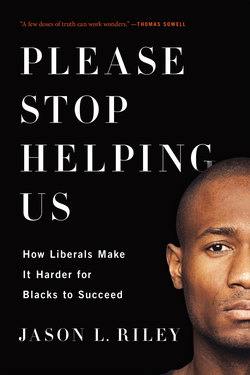Читать книгу Please Stop Helping Us - Jason L. Riley - Страница 2
На сайте Литреса книга снята с продажи.
ОглавлениеPRAISE FOR
Please Stop Helping Us
“From affirmative action to welfare, a devastating examination of the real-life effects of good intentions gone terribly wrong. This thoughtful, lucid and often restrained account of the wreckage produced by racial politics marks Jason L. Riley as one of the nation’s rising political writers.”
—Charles Krauthammer, nationally syndicated columnist and Fox News commentator
“Boom! A combative, conservative shot to the jaw of liberal dogma about black America. Riley is brash in calling out the phony leaders, the false prophets. He exposes the weak thinking behind so many of the smiling faces with good intentions that lead to bad results for those of us most in need of help.”
—Juan Williams, author of Eyes on the Prize: America’s Civil Rights Years, 1954–1965 and Muzzled: The Assault on Honest Debate
“There are people who labor under the impression that the last word on race issues in modern America is work by writers like Cornel West and Michael Eric Dyson. Too few understand that after one has sampled them, true enlightenment can come only by also reading work like this book by Jason L. Riley. The current civil rights orthodoxy is longer on custom than concrete goals. Please Stop Helping Us shows us why.”
—John McWhorter, professor of linguistics and Western civilization at Columbia University and author of Losing the Race: Self-Sabotage in Black America and Authentically Black: Essays for the Black Silent Majority
“Jason L. Riley has written a superb book about government policies that are intended to help blacks, but have instead gone on to injure them with the helping hand. I was particularly taken by the sophistication, scholarly competence, and fresh thinking around these very complex issues. This fine book is a major contribution to our thinking about black socioeconomic progress.”
—Robert L. Woodson Sr., founder and president of the Center for Neighborhood Enterprise
“Pick up a copy and open pages at random to see how the author annihilates nonsense.”
—Thomas Sowell, senior fellow at the Hoover Institute and author of The Housing Boom and Bust
“Please Stop Helping Us thus throws down the gauntlet to those who proclaim their dedication to helping blacks and other minorities advance. If you really care, Riley says, you should help by getting government out of the way.”
—George Leef, Forbes contributor
“Later on, Washington explained, ‘It is important and right that all privileges of the law be ours, but it is vastly more important that we be prepared for the exercise of these privileges.’ It’s the abandonment of these visions that accounts for the many problems of today that Riley’s book does a masterful job of explaining.”
—Walter Williams
“If we want to have an honest conversation about race, we need to begin here. Riley is not afraid to confront this issue or any other. As the conversation on race in America continues, let’s hope his voice gets a hearing.”
—Linda Chavez
Please Stop Helping Us: How Liberals Make It Harder for Blacks to Succeed is a moment of clarity in a tempest of confusion over the impact of social-welfare policy on blacks, particularly in light of recent commemorations of the 50th anniversary of the 1964 Civil Rights Act.”
—Greg Collins, columnist for American CurrentSee, a digital magazine of The Washington Times
“Jason L. Riley writes at length of the frustration of black families with leftist social architects in his must-read book, Please Stop Helping Us: How Liberals Make It Harder for Blacks to Succeed.”
—Ashton Blackwell
“If you are a conservative, I urge you to read it. If you are a leftist, I dare you…Riley’s condensed, statistic-backed, personal-yet-dispassionate style provides an uncommonly stark and complete 176-page examination of the results of leftist policies on black Americans.”
—Andrew Klavan
“Likely to ruffle feathers among leftists.”
—Benjamin Weingarten, The Blaze
“Riley marshals a mountain of compelling statistics. But in the end, this book isn’t about numbers. It’s about the high human toll good intentions have inflicted on people least able to afford them.”
—William McGurn, New York Post
“It perfectly sums up the problem with whites crusading for justice on behalf of blacks.”
—Gavin McInnes
“A wonderfully named book.”
—World Magazine
